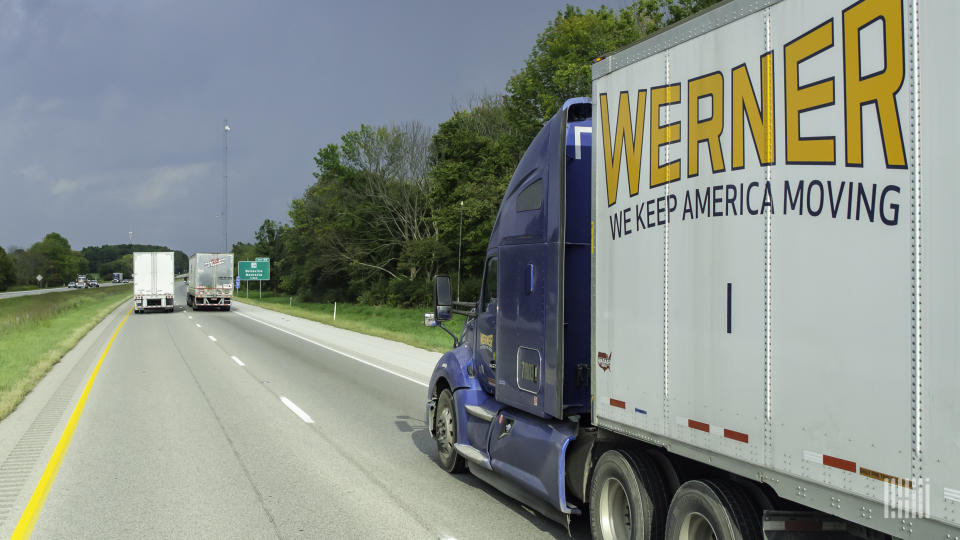Werner’s appeal of $100M Texas verdict focuses on legal arguments

Werner Enterprises has appealed a more than $100 million verdict issued against it to the Texas Supreme Court.
The appeal, filed last week, focuses on questions of law rather than the facts of the horrific 2014 crash that killed one family member and severely injured several others.
The basic facts of the case have been widely known since the original nuclear verdict came down against Werner in 2018 for about $90 million, with added interest pushing the current judgment above the century mark by now.
Just after Christmas 2014, on a day with cold, wet weather and highways slick with black ice, a car driven near Odessa, Texas, by Trey Salinas carrying several members of the Blake family crossed a grassy median and collided head-on with a Werner truck driven by Shiraz Ali. Seven-year-old Zachery Blake was killed, and three other Blake family members suffered serious injuries, one left a quadriplegic. Salinas was not seriously injured and is not a party to the lawsuit.
The lower court decision was affirmed in May by an en banc panel of the state’s 14th District Court of Appeals.
The jury assigned 70% of the blame to Werner (NASDAQ: WERN) and 14% to Ali. Salinas received the other 16%.
At issue in the Werner appeal are several points of law, including the distribution of liability and the judge’s charge to jurors in the original case.
“This case presents a textbook example of the nature and limits of duty and proximate cause,” Werner’s attorneys say in the opening sections of their appeal.
The findings by the lower court and the subsequent upholding of the lower court’s action by the court of appeals shift the question of legal duty significantly in Texas, the attorneys write. What the Werner case means so far is that there is “a legal duty on Texas motorists in the state’s largest appellate district to anticipate that vehicles on the other side of a divided highway will lose control and cross directly into their path,” according to the appeal document. “A failure to foresee this remote possibility and do everything possible to avoid it, including getting off the road entirely, can make a driver 100% responsible for almost any accident.”
In the original finding and the 5-4 appellate decision, Ali was faulted for continuing to proceed down the highway at a rate of speed that could have been considered excessive given the conditions. Testimony suggested his speed was at least 43 mph and maybe as much as 50 mph, while a tow truck operator on the same highway said conditions had forced him to cut his speed to 15 mph. The speed limit on that stretch of Interstate 20 was 75 mph.
Also in the appeal is the question of the liability borne by Werner. One of the issues is whether the “Admission Rule” that helps limit the liability of a company that already has conceded liability in an incident involving an employee should have had an impact on the amount of blame dished out to Werner. “Barring these types of claims would seriously contract, if not eradicate, the “trying the company” strategy that has caused many of the ‘nuclear’ verdicts in recent years,” the Werner attorneys wrote.
The argument over the jury charge involves the precedents set in a decision known as Casteel. Two of the questions in the jury charge “each improperly combined multiple theories of liability against Werner,” which is in conflict with the provisions of Casteel, Werner attorneys write in their appeal. “Commingling these theories requires reversal.” By commingling the arguments in the charge, “the combined submission prevents an appellate court from determining whether the invalid theory affected the jury’s verdict.”
Some of the issues that Werner sees as improperly commingled involve what Werner said were “personal attacks on several Werner employees, including a female manager whom the Blakes’ expert described as a ‘good woman’ who ‘lacked the muscle’ to have headed up its safety unit several years before the crash. That is not a recognized theory of derivative liability in Texas or anywhere else,” the appeal says.
And if something illegitimate is in the judge’s charge to the jury, even if it’s mixed in with other questions, that can impact the jury’s verdict while making it difficult for an appeals court to know just what the jury was thinking; that’s the gist of the Werner argument regarding the Casteel precedent.
Although the appeal is focused on legal issues, it comes back in its conclusion to what happened on the road. “The sole proximate cause of this traffic accident was Salinas’ sudden loss of control of his vehicle,” Werner’s attorneys write in their conclusion. “None of [Werner’s] conduct, whether negligent or not, was any more than a cause of Ali’s being at the site of the accident.” That is not enough to “impose liability in Texas,” Werner concludes.
More articles by John Kingston
Louisiana staged accident scam investigation springs back to life with 5 new indictments
How 1 city is curbing overweight trucks
After declines and revision, US truck jobs now below October 2022 level
The post Werner’s appeal of $100M Texas verdict focuses on legal arguments appeared first on FreightWaves.
